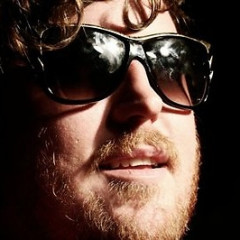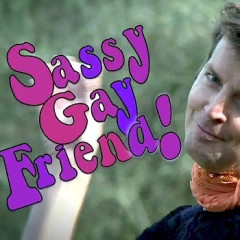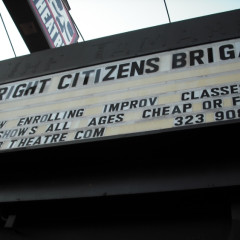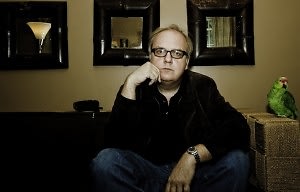 [Photo by Mike Petralia] The parrot was the catalyst, and George threw his arms up in the air.
[Photo by Mike Petralia] The parrot was the catalyst, and George threw his arms up in the air.
"I can't do this interview", he said "Not under these conditions". For the past fifteen minutes this parrot had been squawking and hollering at the man whenever he'd started to talk. We'd tried to ignore it - but even listening back to the audio now, you could barely hear anything else in the room. The two of us sounded like backup singers to the near Janis Joplin-esque shrieking of Charlie, the parrot in question. It should be noted that my friend owns a parrot. Don't ask why he has a parrot. He's a weird guy. He drives a fucking sports car and owns a parrot. Welcome to Beverly Hills.
"I've been through worse than this," he said "I started out a journalist".
Which I suppose would be a good time to give you some backstory on George Hickenlooper. A skilled journalist before jetting off to Hollywood in the mid 1980's, George's documentary work is some of the best in the genre. "The Mayor Of The Sunset Strip" - a brilliantly crafted birds eye view of Los Angeles' celebrity culture over the last thirty years - and "Heart Of Darkness", an amazing look at the making of Apocalypse Now - are both arguably standalone classics.
When not making documentaries, George has also made some of truly fantastic movies, too, such as the Edie Sedgwick biopic 'Factory Girl' and the upcoming 'Casino Jack', which I got the chance to see at the intimidating as fuck CAA Headquarters. (note: CAA Headquarters is nicknamed The Death Star due to its sparse design and sheer size, if you ever wanted to feel as small as hell, smoke a lot of weed and head down to CAA, because that's exactly what I did. Smooth move, Hepburn. Can we say "panic attack"? Woof). The movie deals with the rise and eventual Gatsby-esque downfall of Jack Abramhoff, a Washington lobbyist who swindled from just about everyone as nicely as one person could. It's surprisingly well executed and you leave the theater not only knowing about but also caring about the subject matter; something I feel that the knee-jerk liberal in all of us often overlooks.
On the day of the interview George and I met up at one of those cafes that you drive by in Los Angeles that have thirty people sitting outside, on any given day, at any given hour. One of those lets-do-lunch coffee houses that along with overpriced coffee also serve paninis and ahi salads. Dressed in a beige dress shirt and non-descript jeans, George doesn't exactly fit into the midday Ed Hardy crowd outside of Kings.
Ned Hepburn: Well thanks for meeting me here.
George Hickenlooper: When I first got here to Los Angeles I used to drive by these cafes wondering why people were sitting there at 1pm on a Tuesday. I used to think 'Don't they have jobs?' and rue them. Then I realized that that WAS their job, lunching with clients and coworkers. I never quite understood that.
Ned: Your movies seem to 'the outsider' a lot.
George: They do. I never really thought about it that way. I've always felt like somewhat of an outsider in the Hollywood system. I've always kind of empathized with the outsider in general, really, which probably has to do with my fucked up childhood, you know, on the playground, 'Georgie-Porgie' and all that. Although, Los Angeles is one of the last democratic cities in America. You can come here and do anything. People come here to escape - that's been said before - but people come here to fit into something. Here and Washington DC have a lot in common.
Ned: How so?
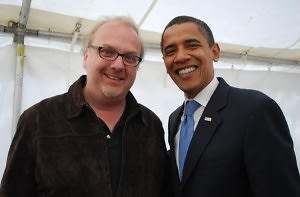 George: You come here to be a part of something bigger than yourself. With Washington it's politics, here it's entertainment. The ego flourishes in both. It's an industry, and there's a place for everyone. McCarthyism and some extreme views aside, it's a very forgiving town. But talking about the 'outsider' comment... I've never been comfortable filling the same adolescent boots as Kevin Smith, do you know what I mean? Never really felt the need to deal with the fecal matter aspect. Or sperm. I think people don't really know how to figure me out here because of that. William Wyler was a very big influence on me - he was a director that supported the story rather than supported the style. Like Quentin Tarantino or Wes Anderson, are you with me? They're great directors in their own rights. All those directors are great but they have a very narrow vision. I'm a big proponent of storytelling.
George: You come here to be a part of something bigger than yourself. With Washington it's politics, here it's entertainment. The ego flourishes in both. It's an industry, and there's a place for everyone. McCarthyism and some extreme views aside, it's a very forgiving town. But talking about the 'outsider' comment... I've never been comfortable filling the same adolescent boots as Kevin Smith, do you know what I mean? Never really felt the need to deal with the fecal matter aspect. Or sperm. I think people don't really know how to figure me out here because of that. William Wyler was a very big influence on me - he was a director that supported the story rather than supported the style. Like Quentin Tarantino or Wes Anderson, are you with me? They're great directors in their own rights. All those directors are great but they have a very narrow vision. I'm a big proponent of storytelling.
Ned: There's a certain element of making these characters likable, though. If you look at the straight facts of Edie Sedgwick with the drugs and eventual psychosis it's a wonder that you could create a likable character out of that.
George: Audience need to like a character. There's a difference between sympathizing with a character and liking them. Like in Taxi Driver - an extreme psycho - but you empathize with his loneliness.
Ned: Speaking of making an unlikeable character likable, why Jack Abramhoff and why now?
George: I just liked the story. He's so larger than life. For me, that whole Bush era, that whole Republican revolution, how it went off the rails completely, is very interesting. His story was a way for me to ventilate my frustration of all the bullshit I'd bought into over the last ten years. It was very cathartic. Abramhoff was vilified. I remember when George Clooney raised his Oscar in 2004 facetiously to Jack Abramhoff. It made me take more interest in his (Abramhoff's) story. So I guess we have Clooney to thank, too.
Ned: I noticed in Factory Girl and 'The Mayor Of Sunset Strip' especially that you dealt with the fame machine as something of another character in the movies.
George: I think what they have in common is that they ARE outsiders. It stems from a deep insecurity. Right. Edie grew up with a fucked up family and went to New York looking for a Father figure which she ultimately found in Andy Warhol and was then spurned him which essentially fueled her downfall. Rodney Bingenheimer (scene impresario / radio DJ who was the focus of Mayor Of The Sunset Strip) came to Los Angeles to find family and found it in the celebrity and the surrounding celebrity culture. It's something they both felt they needed. Ultimately, they found what they wanted.
Ned:: Agreed, but they both seemed very lonely.
George: I suppose that's the other side of the coin.
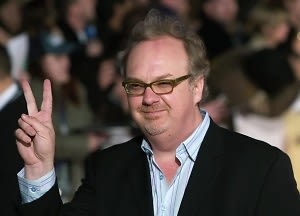 Ned: In your new movie 'Casino Jack', Jack Abramhoff seems to be in the same boat as Edie and Rodney.
Ned: In your new movie 'Casino Jack', Jack Abramhoff seems to be in the same boat as Edie and Rodney.
George: He became an Orthodox at the age of 12 and his father was embarrassed by that, so you had a Jewish father being anti-Semitic against his own son. Regardless of this, He's a very charismatic guy. When I met with Jack at the prison in Maryland he would not stop doing impressions. He does it to disarm people. Me and Kevin (Spacey, who portrays Jack) and he sat around the table - Jack doing a Regan impression and Kevin doing Bill Clinton. It was quite a sight. Jack uses humor to relate to others. He loves movies. In his own way, Jack fits into that same mold as Edie and Rodney. With Abramhoff I think as an Orthodox Jew never really got the attention he wanted from his father and rather than become famous in the more conventional sense he went to DC.
Ned: But he came to Hollywood first, briefly.
George: There's a great book called 'The Empire Of The Room' about why the Jews came to Hollywood - because they weren't allowed into the New York banking industry at the turn of the last century. They weren't allowed into the Ivy League at the early part of the last century. That's why they came to LA, because they were outsiders, to create an empire of their own. There's a lot of similatiries between Washington DC and Los Angeles.The whole town is run on the spirit of the outsider if you boil it all down. Los Angeles draws outsiders so that they can empower themselves.
Ned: What year did you get here?
George: I earned some money in New Haven, came out here in the summer of 1987. I've been here ever since.
Ned: I read a Tom Waits interview who lived in Hollywood for many years where he says how everything keeps shifting here, where they knock down one building and raise another so fast that the whole landscape changes very fast.
George: Los Angeles is a very transient culture. It doesn't matter if you come from an affluent background or from the streets, the city doesn't give a shit, really. It makes it a very unique city from the rest of the world.
Ned: It doesn't give a shit more-so than New York?
George: New York is a city of "no" and Los Angeles is a city of "yes". It's not easy, its very tough here. But if you persevere, the money will come. I think LA represents the last outpost of the American Dream - the old west.
We scheduled a follow up interview for the next day, and the parrot fucked everything up. The audio was trashed thanks to the bird. I got a voicemail from George a few days later, "Apologies for the other day (with the parrot). I've been working non-stop for the last few days. I'm exhausted. The bird," he laughed "I think I understand it now".


.jpg)
.jpg)



.jpg)
.jpg)
.jpg)

.jpg)
